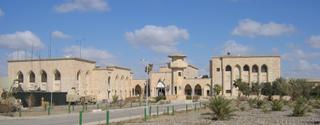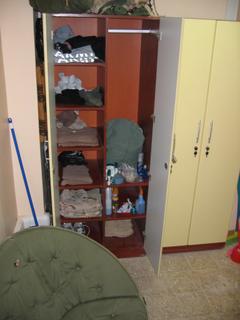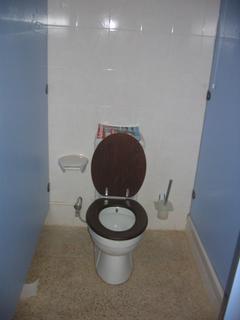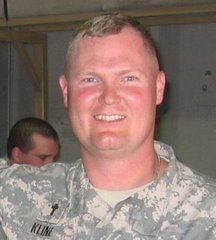 (Above is a picture of FOB Dagger: where we lived for the first half of our deployment. It is a poorly constructed palace for Saddam, on a cliff overlooking the Tigris River. Keeping electricity and water running in that marble dump was far more difficult than it should have been. It is now home to Iraqi Army forces. FOB Speicher, where we currently live, is too large and spread out to capture in a picture; not as picturesque as a palace, regardless how poorly designed.)
(Above is a picture of FOB Dagger: where we lived for the first half of our deployment. It is a poorly constructed palace for Saddam, on a cliff overlooking the Tigris River. Keeping electricity and water running in that marble dump was far more difficult than it should have been. It is now home to Iraqi Army forces. FOB Speicher, where we currently live, is too large and spread out to capture in a picture; not as picturesque as a palace, regardless how poorly designed.)It all balances out in the end. That's the popular wisdom here in theater with regard to the widely divergent living conditions soldiers experience. There are essentially three things to consider: the larger FOB environment, proximity to the flagpole, and basic accommodations. There are many different FOBs and Patrol Bases in theater. There are places where soldiers wear kevelar AND body armor whenever they're outdoors, places where soldiers wear only kevelar, and places wear soldiers simply wear soft caps. Commanders' risk assessments determine what the uniform will be. Where we live, most soldiers wear only kevelar; we, however, wear our body armor as well. This causes most soldiers to grumble on occasion (wearing 20-30lbs of armor, tools, and ammunition in extreme heat is uncomfortable to say the least), but that grumbling stops when enemy rockets and mortars land inside the FOB. There are plenty of soldiers whose missions rarely if ever require them to leave the FOB--they are affectionately called "fobbits".
Typically, the larger the FOB the more it resembles a garrison environment, with a more laid-back, almost stateside feel to life. Smaller FOBs and patrol bases are often more rustic, and most soldiers living on these leave the wire on a regular basis. Some of the smallest places are down right primitive. And yet morale, in some ways, is higher here than on the larger FOBs. Living out in the sticks in the smaller places--or away from the flagpole (command centers)--soldiers experience greater autonomy and typically are confronted with risk more frequently, which can result in intense bonding. The larger FOBs have great accommodations such as nice dining facilities, phone and internet centers (if not internet and satellite TV in the rooms!), gyms, swimming pools, large PXs or shopping centers, movie theaters, and of course, air conditioning. Typically, the smaller the base, the more austere the conditions. There are exceptions, however. Our new FOB is big, but the majority of our soldiers live in what everyone calls the crack houses: bullet-riddled crumbling apartments, many of which do not have inside bathroom facilities--they are pretty bleak. I and a few others are fortunate to live in one of the few refurbished buildings. In my trips to visit with our soldiers throughout the area I have stayed in a variety of living conditions. The fact is, after a few days--I tend to adapt to my environment and most discomforts are soon forgotten.
In the pictures below you can see the small, airconditioned room I share with my roommate, Captain Chris Poteet. We have bunkbeds and each of us have a wall locker for our belongings. We also have a latrine with showers and porcelain bowls and sinks (pictured is one of our nice toilets). Compare this to the plywood crafted crappers at patrol base Uvani, where SGT Lee and I stayed last month visiting soldiers. Toilet seats are nailed to the wood, over a hole where a steel can lies beneath to catch the waste. These cans are then taken aside in the early morning and their contents are burned, or purified with fire, and put back in place. Once again, it all balances out: those with rougher conditions, enjoy more freedom, bonding, and some would say excitement than others.





No comments:
Post a Comment